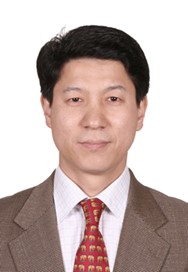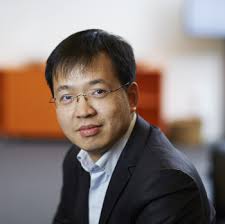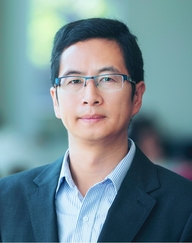 Prof. Zhisheng Niu
Prof. Zhisheng Niu
Tsinghua University, China
IEEE Fellow, IEICE Fellow
Title: URLLC: Some Perspectives from Queuing Theory:
Zhisheng Niu graduated from Northern Jiaotong University (currently Beijing Jiaotong University), China, in 1985, and got his M.E. and D.E. degrees from Toyohashi University of Technology, Japan, in 1989 and 1992, respectively. During 1992-94, he worked for Fujitsu Laboratories Ltd., Japan, and in 1994 joined with Tsinghua University, Beijing, China, where he is now a professor at the Department of Electronic Engineering. He was a Visiting Researcher at National Institute of Information and Communication Technologies (NICT), Japan (10/1995 – 02/1996), Hitachi Central Research Laboratory, Japan (02/1997 – 02/1998), Saga University, Japan (01/2001 – 02/2001), Polytechnic University of New York, USA (01/2002 – 02/2002), University of Hamburg, Germany (09/2014 – 10/2014), and University of Southern California, USA (11/2014-12/2014). His major research interests include queueing theory, traffic engineering, mobile Internet, radio resource management of wireless networks, and green communication and networks.
Dr. Niu has served as Chair of Emerging Technologies Committee (2014-15), Director for Conference Publications (2010-11), and Director for Asia-Pacific Board (2008-09) in IEEE Communication Society, and currently serving as the Editor-in-Chief of IEEE Trans. Green Commun. & Networks. He received the Outstanding Young Researcher Award from Natural Science Foundation of China in 2009 and the Best Paper Award from IEEE Communication Society Asia-Pacific Board in 2013. He was also selected as a distinguished lecturer of IEEE Communication Society (2012-15) as well as IEEE Vehicular Technologies Society (2014-16). He is a fellow of both IEEE and IEICE.
 Prof. Yan Zhang
Prof. Yan Zhang
University of Oslo, Norway
IEEE Fellow
Title: Digital Twin for 6G
Bio:
(IEEE Fellow’20) received the Ph.D. degree from the School of Electrical and Electronics Engineering, Nanyang Technological University, Singapore. He is currently a Full Professor with the Department of Informatics, University of Oslo,Oslo, Norway. His research interests include next-generation wireless networks leading to 5G beyond/6G, green and secure cyber-physical systems (e.g., smart grid and transport). Dr. Zhang is an Editor for several IEEE publications, including IEEE Communications Magazine, IEEE Network Magazine, IEEE Transactions on Vehicular Technology, IEEE Transactions on Industrial Informatics, IEEE Transactions on Green Communications and Networking, IEEE Communications Survey and Tutorials, IEEE Internet of Things Journal, IEEE Systems Journal, IEEE Vehicular Technology Magazine, and IEEE Blockchain Technical Briefs. He is a symposium/track chair in a number of conferences, including IEEE ICC 2021, IEEE Globecom 2017, IEEE PIMRC 2016, IEEE SmartGridComm 2015. He is an IEEE Vehicular Technology Society Distinguished Lecturer during 2016-2020 and he is named as CCF 2019 Distinguished Speaker. He is the Chair of IEEE Communications Society Technical Committee on Green Communications and Computing (TCGCC). He is an elected member of CCF Technical Committee of Blockchain. In both 2019 and 2018, Prof. Zhang was a recipient of the global “Highly Cited Researcher” Award (Web of Science top 1% most cited world wide).
Abstract:
In this talk, we mainly introduce our recent studies on Digital Twin for 6G. We will first present Digital Twin concepts and models; as well as our proposed new research paradigm DITEN (Digital Twin Edge Networks) in 6G. Then, we focus on research problems related to: (i) communication-efficient federated learning for DITEN; (ii) reduced latency Blockchain and federated learning for DITEN; and (iii) edge association as a new unique research challenge in Digital Twin for 6G. Finally, we point out open research questions for further study.
 Prof. F. Richard Yu
Prof. F. Richard Yu
Carleton University, Canada
IEEE Fellow, IET Fellow, EIC Fellow
Title: Networking: From Matter, Energy, Information, to Intelligence:
Prof. F. Richard Yu received the PhD degree in electrical engineering from the University of British Columbia (UBC) in 2003. From 2002 to 2006, he was with Ericsson (in Lund, Sweden) and a start-up (in San Diego, CA, USA), where he worked on the research and development in the areas of advanced wireless communication technologies and new standards. He joined Carleton School of Information Technology and the Department of Systems and Computer Engineering (cross-appointment) at Carleton University, Ottawa, in 2007, where he is currently a Professor. His research interests include cyber-security, connected and autonomous vehicles, artificial intelligence, blockchain, and wireless systems. He has published 600+ papers in reputable journals/conferences, 8 books, and 28 granted patents, with 10,000+ citations (Google Scholar). He received the IEEE TCGCC Best Journal Paper Award in 2019, Distinguished Service Awards in 2019 and 2016, Outstanding Leadership Award in 2013, Carleton Research Achievement Awards in 2012 and 2021, the Ontario Early Researcher Award (formerly Premiers Research Excellence Award) in 2011, the Excellent Contribution Award at IEEE/IFIP TrustCom 2010, the Leadership Opportunity Fund Award from Canada Foundation of Innovation in 2009 and the Best Paper Awards at IEEE ICNC 2018, VTC 2017 Spring, ICC 2014, Globecom 2012, IEEE/IFIP TrustCom 2009 and Int’l Conference on Networking 2005.
He serves on the editorial boards of several journals, including Co-Editor-in-Chief for Ad Hoc & Sensor Wireless Networks, Lead Series Editor for IEEE Transactions on Vehicular Technology, IEEE Communications Surveys & Tutorials, and IEEE Transactions on Green Communications and Networking. He has served as the Technical Program Committee (TPC) Co-Chair of numerous conferences. He has been named in the Clarivate Analytics list of “Highly Cited Researchers” since 2019. He is an IEEE Distinguished Lecturer of both Vehicular Technology Society (VTS) and Comm. Society. He is an elected member of the Board of Governors of the IEEE VTS and Editor-in-Chief for IEEE VTS Mobile World newsletter. Dr. Yu is a registered Professional Engineer in the province of Ontario, Canada, an IEEE Fellow, IET Fellow, and Engineering Institute of Canada (EIC) Fellow.
Abstract:
By enabling information networking among people and machines, the Internet has become one of the major foundations for our socio-economic systems. After several decades of research and development of the Internet, it is relatively easy for humans/machines to obtain information. However, there are new challenges in the post-Internet era, including information overload, fake information and the design of trustworthy, cost-effective autonomous systems. In order to address these challenges, we need to think about networking in a larger timescale. Actually, in order to facilitate humans’ cooperation, we have invented technologies enabling networking for matter (grid of transportation), for energy (grid of energy), and for information (the Internet). In this paper, we argue that the next networking paradigm could be intelligence networking, where intelligence can be easily obtained, like matter, energy, and information. In this talk, we will present some recent advances in these areas. Then, we discuss some open issues and challenges that need to be addressed in the future.

